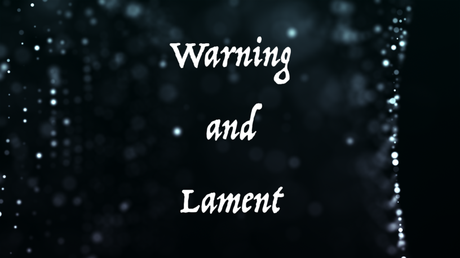Grace Thoughts
Warning and Lament: The Collapse of Civilizations (Part Four)

In the last three parts of our series we have seen how civilizations collapse and witnessed two examples in Israel and Judah. Even as we saw how long God warned both kingdoms about impending destruction if they did not repent and obey the Lord, we will now see how deeply societal collapse affects both leaders and citizens.
We might want to rush to judge the leaders of collapsed societies as primarily to blame for the collapse, but citizens of those nations bear some of the blame as well. We are reminded about the people’s part in the collapse of their society from Jeremiah chapter 5:
Just as you have forsaken Me and served foreign gods in your land, so you shall serve aliens in a land that is not yours’ … But this people has a defiant and rebellious heart; They have revolted and departed. They do not say in their heart, ‘Let us now fear the Lord our God, Who gives rain, both the former and the latter, in its season. He reserves for us the appointed weeks of the harvest.’ Your iniquities have turned these things away, And your sins have withheld good from you … For among My people are found wicked men; They lie in wait as one who sets snares; They set a trap; They catch men. As a cage is full of birds, So their houses are full of deceit. Therefore they have become great and grown rich. They have grown fat, they are sleek; Yes, they surpass the deeds of the wicked; They do not plead the cause, The cause of the fatherless; Yet they prosper, And the right of the needy they do not defend. Shall I not punish them for these things?’ says the Lord. ‘Shall I not avenge Myself on such a nation as this?’ An astonishing and horrible thing Has been committed in the land: The prophets prophesy falsely, And the priests rule by their own power; And My people love to have it so. But what will you do in the end?
Let those words sink in for a moment. People who are in a position to speak for God speak falsely. People who are in a position to rule the people by God’s power choose instead to rule by their own power. “And My people love to have it so.” The leaders and the people share blame in the collapse of their society because they told lies and believed lies. They deceived and allowed themselves to be deceived.
The Lament
We move now from the warnings of God to the lament of His people and the true prophets. One of the hardest books to read in the Bible is also one of the most important to read. It is the Book of Lamentations. The prophet Jeremiah wrote it as part of his experience in prophesying to the Kingdom of Judah. The word lament means “loud cries, a passionate expression of grief or sorrow.”
First, some background. We know from the first words of the Book of Jeremiah that Jeremiah was the son of a priest. God’s Word came to Jeremiah in the days of Josiah, the son of Amon. Josiah was the last of the good kings in Judah. There were not many and he was the last. Jeremiah also prophesied during the reigns of King Jehoiakim until the end of the eleventh year of Zedekiah, Judah’s last king, and until the final carrying away of Jerusalem’s captives.
It’s interesting to note that the Hebrew leader and prophet Joshua warned of the coming judgment of God on the leaders and people of Judah and Jerusalem 800 years before the Babylonian destruction:
Behold, this day I am going the way of all the earth. And you know in all your hearts and in all your souls that not one thing has failed of all the good things which the Lord your God spoke concerning you. All have come to pass for you; not one word of them has failed. Therefore it shall come to pass, that as all the good things have come upon you which the Lord your God promised you, so the Lord will bring upon you all harmful things, until He has destroyed you from this good land which the Lord your God has given you. When you have transgressed the covenant of the Lord your God, which He commanded you, and have gone and served other gods, and bowed down to them, then the anger of the Lord will burn against you, and you shall perish quickly from the good land which He has given you. Joshua 23:14-16
God’s centuries-long warnings turned to active judgment in the last several years of Judah’s history leading up to final exile in Babylon. Nebuchadnezzar invaded Judah after defeating Egypt’s Pharaoh Necho at the Battle of Carchemish in 605 BC. Jehoiakim became a vassal king, but rebelled in 602 BC. when Necho was able to retake Gaza from the Babylonians. That began a war between Judah and Babylon that lasted from 601 until 586 BC. The war included two major sieges of Jerusalem by King Nebuchadnezzar. The Babylonians finally won the war and destroyed Jerusalem.
We learn about the conflict from two primary sources: the Bible and the ancient Nebuchadnezzar Chronicle (also known as the Jerusalem Chronicle). Many of Judah’s leaders, along with thousands of citizens, were forcefully taken captive. Thousands more died from violence and starvation during the lengthy sieges of Jerusalem by the Babylonian army. It was during that horrible time that the people of Judah “cried aloud” (lamented).
As we look at the “lamentations” of the prophet Jeremiah and the people of Judah, I want you to consider the loud cries of people throughout history who have experienced bitter suffering and great grief and sorrow because of the collapse of their society. The experience of Judah is not unlike that of societies before them or since. Humans of all ages share many commonalities no matter when or where they lived. Pain is pain. Suffering is suffering. Grief is grief. Sorrow is sorrow. May we learn a lesson for our own time as we look into the excruciating horror of another time.
Lamentations
Jeremiah wrote the Book of Lamentations to describe the horror of what happened to God’s people at the hands of the Babylonians and by their own hands.
How lonely sits the city That was full of people! How like a widow is she, Who was great among the nations! The princess among the provinces Has become a slave! She weeps bitterly in the night, Her tears are on her cheeks; Among all her lovers She has none to comfort her. All her friends have dealt treacherously with her; They have become her enemies. Lamentations 1:1-2
It’s important to keep in mind that Jeremiah was an eyewitness to the destruction of Jerusalem. He knew the pain of his people as his own pain. Jeremiah documented the judgment of God on His disobedient people, even as he shared the hope of God’s future compassion.
Jeremiah’s lament began before the lament of the people of Judah. God commanded Jeremiah to cut off his hair and cast it away, “and take up a lamentation on the desolate heights; for the Lord has rejected and forsaken the generation of His wrath. For the children of Judah have done evil in My sight,’ says the Lord” (Jeremiah 7:29-30).
That is often the way of prophets. They feel the pressure of God’s approaching judgment long before judgment day arrives. The prophet often experiences lament as they warn the people of impending doom. It’s difficult to know the awful things that are coming to a society, to a civilization, and not cry out. Jeremiah knew what was coming decades before it arrived and he lamented it in advance. Interestingly, there came a point in Jeremiah’s prophesies where God told him to no longer lament what would happen to Judah. As hard as it is to read, it is part of the wrath of Almighty God and a prophet must prepare for it. Preparing for the coming judgment of God does not mean that a prophet does not feel sorrow and compassion for his people, but he knows that the judgments of God are righteous and just.
They shall die gruesome deaths; they shall not be lamented nor shall they be buried, but they shall be like refuse on the face of the earth. They shall be consumed by the sword and by famine, and their corpses shall be meat for the birds of heaven and for the beasts of the earth.’ For thus says the Lord: ‘Do not enter the house of mourning, nor go to lament or bemoan them; for I have taken away My peace from this people,” says the Lord, “lovingkindness and mercies. Both the great and the small shall die in this land. They shall not be buried; neither shall men lament for them, cut themselves, nor make themselves bald for them. Jeremiah 16:4-6
The MacArthur Study Bible has a helpful outline for understanding Lamentations. You may find it helpful in your study.
I. The First Lament: Jerusalem’s Devastation (1:1-22)
II. The Second Lament: The Lord’s Anger Explained (2:1-22)
III. The Third Lament: Jeremiah’s Griefs Expressed (3:1-66)
IV. The Fourth Lament: God’s Wrath Detailed (4:1-22)
V. The Fifth Lament: The Remnant’s Prayers (5:1-22)
Remember
Reading the Book of Lamentations is very difficult unless you keep in mind what transpired before Judah’s final days under the sieges of the Babylonian army. The false prophets lied, the priests ruled according to their own will and the people loved it that way. The leaders and citizens of Judah had thumbed their noses at God’s Word and will for centuries. The majority of Judah’s kings did great evil in God’s sight. They led the people to worship idols and participate in sexual immorality and blatant disregard for the needs of the poor. God, through the true prophets, warned Judah for decades. He was very specific and detailed in His warnings. He offered Judah’s leaders and people a way to escape His approaching judgment. All they had to do was repent of their sinfulness and obey God. Except for a few of Judah’s kings, Josiah being the last one, the leadership of Judah refused to change its evil ways.
As you read about the horrors of what happened during the sieges and final destruction of Jerusalem by the Babylonians, remember that the leaders and citizens of Judah had received ample warning. It’s not easy to see fellow humans suffering so much, but we must ask some important questions about what they knew, when they knew it and how they responded to what they knew before making accusations of cruelty against God. The Lord was long-suffering, merciful and just in all His dealings with the people of Judah.
Next Time
We will look at what the future holds for current civilizations and societies in the next part of our special series – Warning and Lament: The Collapse of Civilizations.
Scripture taken from the New King James Version®. Copyright © 1982 by Thomas Nelson. Used by permission. All rights reserved.
GraceLife © 1990-2021
 Babylonian EmpireGodKing NebuchadnezzarLamentationsOld Testament ProphetsProphet Jeremiah
Babylonian EmpireGodKing NebuchadnezzarLamentationsOld Testament ProphetsProphet Jeremiah

Published by gracelifethoughts
Founder & Director of GraceLife Ministries View all posts by gracelifethoughts
